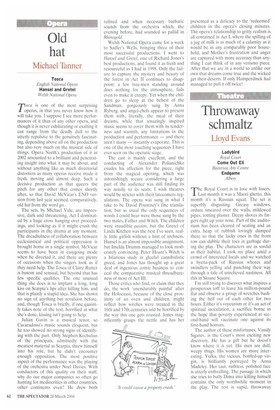Old hat
Michael Tanner
Tosca English National Opera Hansel and Gretel Welsh National Opera Tbsca is one of the most surprising / operas, in that you never know how it will take you. I suppose I see more performances of it than of any other opera, and though it is never exhilarating or exalting it can range from the deadly dull to the utterly repulsive to the genuinely fascinating, depending above all on the production but also very much on the musical side of things. Opera North's production of it in 2002 amounted to a brilliant and penetrating insight into what it may be about, and without anything like as much directorial distortion as many operas receive made it fresh, moving and almost deep. Such a decisive production as that queers the pitch for any other that comes shortly after, so that David McVicar's ENO version from last year seemed, comparatively, old hat from the word go.
The sets, by Michael Vale, are impressive, dark and threatening, Act I dominated by a huge cross hanging over proceedings, and looking as if it might crush the participants in the drama at any moment. The dreadfulness of collaboration between ecclesiastical and political oppression is brought home in a single symbol. Mc Vicar seems to have been in easygoing mode when he directed it, and there are plenty of occasions when the singers look as if they need help. The Tosca of Claire Rutter is buxom and sensual, but beyond that has few specific qualities. The one unusual thing she does is to implant a long, long kiss on Scarpia's lips after killing him, and that is plainly a stupid idea. She has shown no sign of anything but revulsion before, and, though Tosca is briefly, if one quaintly takes note of the text, horrified at what she's done, kissing isn't going to help.
Julian Gavin is a musical tenor, so Cavaradossi's music sounds eloquent, but he too showed no strong signs of identifying with the part. Only Stephen Kechulius of the principals, admittedly with the meatiest material as Scarpia, threw himself into his role, but he didn't encounter enough opposition. The most positive aspect of the performance was the playing of the orchestra under Noel Davies. With conductors of this quality on their staff, why do our major companies so often go hunting for mediocrities in other countries, other continents even? He drew both refined and when necessary barbaric sounds from the orchestra which, the evening before, had sounded so pallid in Rhinegold.
Welsh National Opera came for a week to Sadler's Wells, bringing three of their most successful productions. I went to Hansel and Gretel, one of Richard Jones's best productions, and found it as fresh and resourceful as I had in 1998. Only the failure to capture the mystery and beauty of the forest in Act II continues to disappoint: a few tree-men standing around does nothing for the atmosphere, fails even to make it creepy. Yet when the children go to sleep at the behest of the Sandman, gorgeously sung by Anna Ryberg, and angel-chefs appear to present them with, literally, the meal of their dreams, while that amazingly inspired music seems to cover them with its tenderness and warmth, any limitations in the production and performance — and there aren't many — instantly evaporate. This is one of the most touching sequences I have ever seen on the operatic stage.
The cast is mainly excellent, and the conducting of Alexander Polianichko exudes his affection for the piece, right from the magical opening, which was astonishingly secure considering a large part of the audience was still finding its way noisily to its seats; I wish theatres would be stricter with their latecomers regulations. The opera was sung in what I take to be David Pountney's fine translation, but as usual the only sequences of words I could hear were those sung by the two males, Father and Witch. The children were inaudible passim, hut the Gretel of Linda Kitchen was the best I've seen, really little girlish without a hint of archness. Hansel is an almost impossible assignment, but Imelda Drumm managed to look moderately convincing. Peter Hoare's Witch is a hilarious study in gleeful cannibalistic greed, and Jones has thought up a great deal of ingenious comic business to conceal the comparative musical threadbareness of most of Act III.
Those critics who find, or claim that they do, the work unendurably painful' after the Holocaust, because of the close proximity of an oven and children, might reflect how witches were treated in the 16th and 17th centuries and be horrified by the way this one gets roasted. Jones magnificently grasps the nettle and has her presented as a delicacy to the 'redeemed' children in the opera's closing minutes. The opera's relationship to gritty realism is all contained in Act I, where the spilling of a jug of milk is as much of a calamity as it would be in any comparably poor household, and Mother's frustration and anger are captured with more accuracy than anything I can think of in any verismo piece. After that we are in a world so unlike our own that dreams come true and the wicked get their deserts. If only Humperdinck had managed to pull it off twice!


















































































 Previous page
Previous page